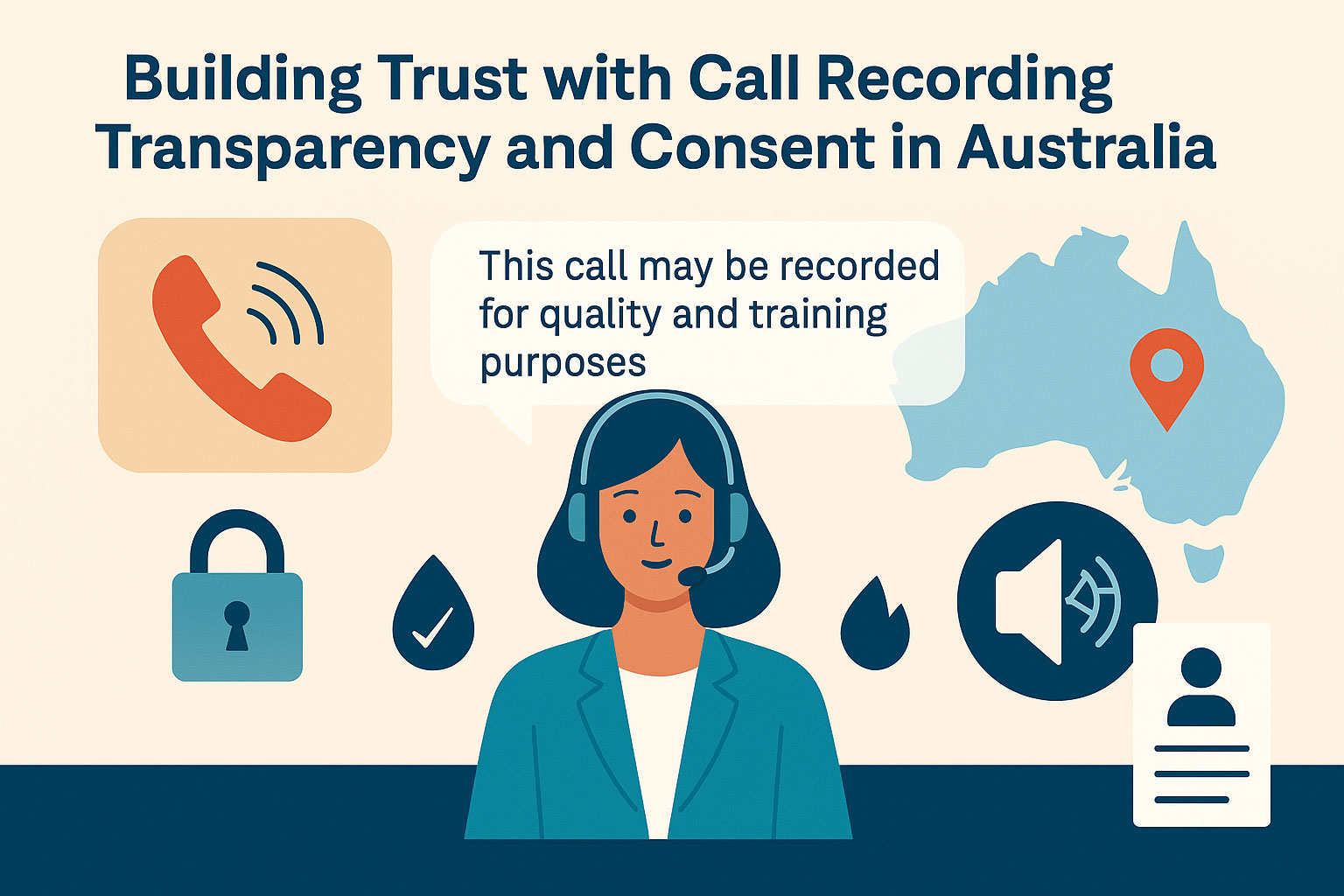
Building Trust with Call Recording Transparency and Consent in Australia
Every day, thousands of Australian organisations record customer calls for training, dispute resolution, and quality assurance. Call recording helps companies understand service performance, improve agent communication, and meet regulatory obligations. Yet while recording calls is common practice, the way it’s managed has a direct impact on customer trust.
People want to know when they’re being recorded and why. Clear disclosure creates confidence; secrecy or vague explanations can do the opposite. In an era where data privacy is at the forefront of mind, businesses must ensure that recording practices are transparent, fair, and compliant.
Through compliant business process outsourcing services, Australian organisations can manage call recording responsibly, maintaining accountability while preserving customer relationships.
The Legal Framework for Call Recording in Australia
Call recording in Australia is governed by several overlapping laws, and understanding them is crucial for compliance.
At the federal level, the Privacy Act 1988 (Cth) and the Australian Privacy Principles (APPs) set out how personal information, including audio recordings, must be collected and stored. The Telecommunications (Interception and Access) Act 1979 also makes it illegal to intercept live communications without proper consent.
Individual states and territories add another layer of complexity through their Surveillance Devices Acts, which vary across jurisdictions. For example, New South Wales and Victoria typically require consent from all parties before recording, while Queensland and Western Australia allow recording if at least one party agrees. Because contact centres often serve customers nationwide, most operate to the strictest interpretation, obtaining clear, dual consent at the start of each call.
This multi-layered framework means businesses must review not just their technology but also their processes and training. A single oversight, such as failing to play a recording notice on transferred calls, can breach privacy laws and expose the organisation to penalties.
For a more detailed guide on retention requirements and how SMEs should manage customer access requests, you can read our article on recording, retention and access obligations.
The Role of Transparency in Building Customer Trust
Transparency does more than satisfy legal obligations; it strengthens brand credibility. When a customer hears an upfront message such as “This call may be recorded for quality and training purposes,” it signals honesty. Rather than deterring people, these disclosures show that the business takes accountability seriously.
Clear communication benefits both sides. Customers understand how their information will be used, while businesses create a verifiable record that can protect them in case of disputes. Transparency also improves staff morale by showing that management values fair practices and consistency.
Ultimately, trust is built not through complex legal language but through openness and respect. Each clear disclosure reinforces the message that the company operates ethically and values its relationship with customers.
Consent in Practice: What Australian Customers Expect
Consent isn’t a checkbox, it’s an ongoing commitment to fairness and choice. Most Australians are familiar with standard call-recording notices, yet they still expect companies to communicate clearly.
Good practice involves explaining three simple things:
- That the call is being recorded.
- Why it’s being recorded.
- What options does the customer have if they don’t wish to be recorded?
Customers should be offered alternatives such as email, chat, or written correspondence. If a call is transferred between departments, it’s good practice to repeat the recording notification so that consent is refreshed. The same applies when a recording is paused and resumed.
Businesses that adopt this approach find it easier to manage complaints, as customers feel included in the process rather than monitored without permission.
Risks of Non-Compliance
Failing to obtain proper consent or disclose call recording can have serious consequences. The Office of the Australian Information Commissioner (OAIC) has the power to investigate breaches of the Privacy Act and issue substantial fines. Even when penalties are avoided, reputational damage can be lasting.
Public exposure of non-compliant practices, such as recording without warning or storing calls insecurely, can erode years of brand trust. Customers may feel misled or violated, particularly when recordings contain sensitive information like payment details or medical data.
Beyond external scrutiny, there’s also the internal impact. Staff morale suffers when employees are unsure about privacy expectations. Confusion leads to inconsistency, and inconsistency leads to mistakes. The cost of rebuilding trust after such an incident is almost always higher than investing in compliance from the start.
Best Practices for Call Recording Transparency
Achieving transparency requires deliberate structure, not guesswork. Several core practices make compliance sustainable:
- Regular script reviews: Recording notices should be checked and updated to reflect current legislation and company policy.
- Staff training: Agents must understand how to communicate recording disclosures naturally and confidently, without rushing or reading verbatim.
- Accessible policies: Information about call recording should be available on websites, in customer service charters, and within on-hold messages.
- Data handling and retention: Recordings must be securely stored and deleted once they are no longer needed for their original purpose.
- Audit and documentation: Logs should confirm when and how consent was obtained, especially for inbound sales and support calls.
These practices keep customers informed while providing organisations with clear audit trails and proof of compliance.
How Outsourced Contact Centres Maintain Compliance
Outsourced contact centres bring consistency and expertise to compliance management. Providers that specialise in Australian markets embed privacy protocols into every interaction. Operators are trained to deliver accurate disclosures and use systems that automatically announce recording notices at the start of each call.
Modern systems include encrypted storage, restricted access controls, and automatic data-retention policies. When a client’s legal or operational needs change, these parameters can be adjusted quickly across all teams. This ensures that privacy standards remain current without disrupting daily operations.
For businesses partnering with providers like OracleCMS, the benefit extends beyond technology. They gain process stability, consistent scripts, quality checks, and full traceability across multiple clients or divisions. These elements make outsourced services an effective way to uphold both compliance and customer trust.
Creating a Culture of Ethical Communication
Compliance is only the foundation; culture is what sustains it. Ethical communication starts with viewing call recording not as surveillance but as a service improvement. When employees and customers both understand its purpose, it becomes a shared commitment to quality rather than a one-sided process.
Australian consumers value honesty and fairness. Companies that make transparency part of their culture rather than an afterthought stand out in crowded markets. They avoid the defensive tone of legal compliance and instead demonstrate genuine respect for the people they serve.
Embedding ethics into communication doesn’t require complex systems. It requires awareness, consistency, and leadership that prioritises openness at every level of the organisation. Over time, these behaviours form the backbone of customer loyalty and operational credibility.
FAQ’s
Q1: Is consent always required to record customer calls in Australia?
A1: In most cases, yes. The Privacy Act and state laws require at least one party’s consent, and many jurisdictions require both. Obtaining clear consent avoids legal risk and builds customer confidence.
Q2: How should businesses notify callers about recording?
A2: Provide a clear notice at the start of the call, stating that the conversation will be recorded and why. This may be automated or spoken by the agent.
Q3: Can customers refuse to be recorded?
A3: Yes. They should be offered alternatives such as email, online chat, or written communication to ensure they can engage without being recorded.
Q4: What are the main risks of non-compliance?
A4: Breaching privacy laws can lead to fines, public complaints, and long-term reputational damage if customers feel deceived.
Q5: How can outsourcing help maintain compliance?
A5: Outsourced contact centres maintain consistent scripts, provide staff training, and use secure systems that comply with Australian privacy regulations.



